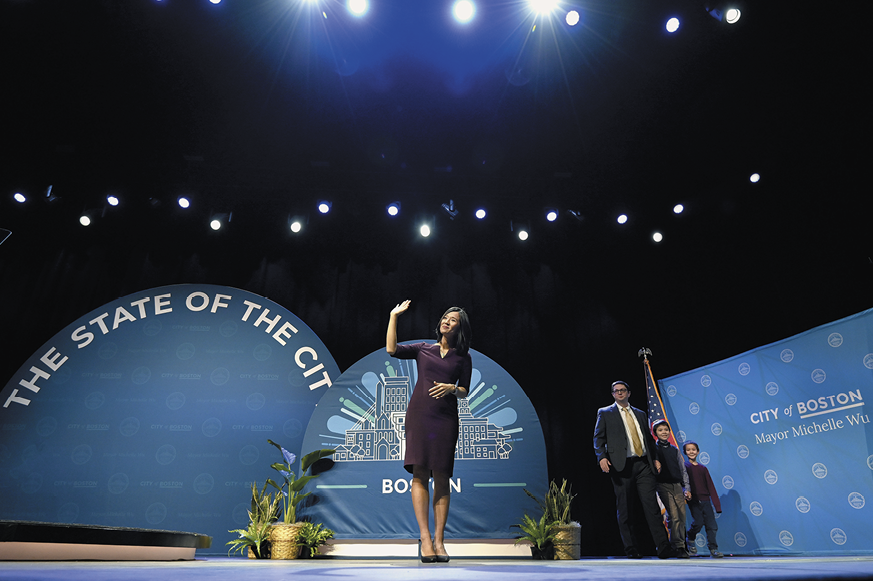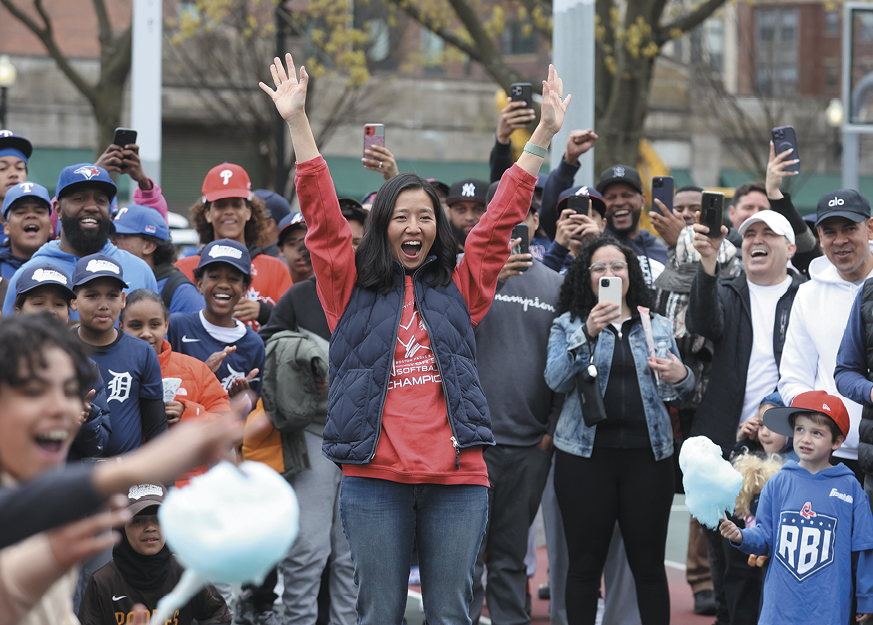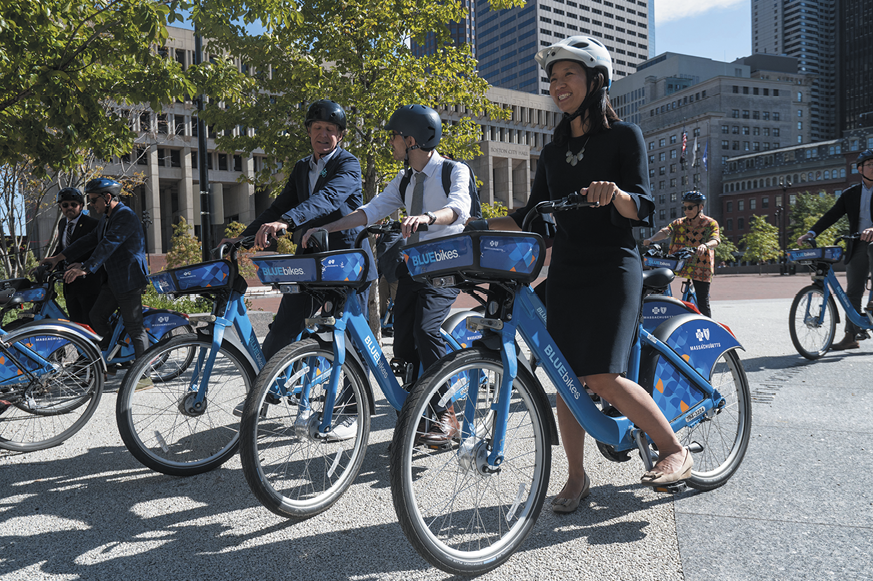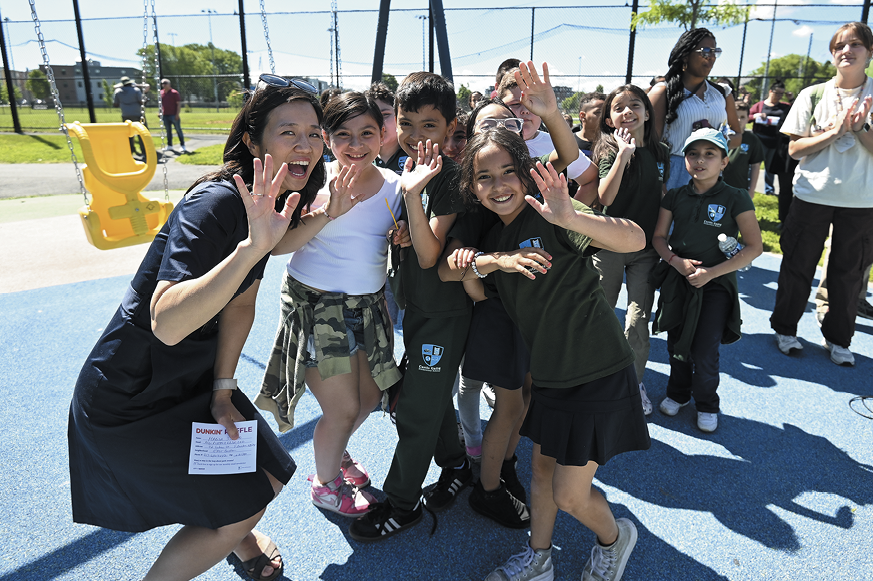- Home
- Media Kit
- MediaJet
- Current Issue
- Past Issues
- Ad Specs-Submission
- Reprints (PDF)
- Photo Specifications (PDF)
- Contact Us
- PRIVACY POLICY
- TERMS OF USE
![]()
ONLINE
![]()
ONLINE

Making Boston A
Home For Everyone
Editors’ Note
Michelle Wu is the first woman and first person of color to be elected Mayor of Boston. Wu got her start in public service interning at City Hall under Mayor Tom Menino while studying at Harvard Law School. She is an alumna of the Rappaport Fellows Program in Law and Public Policy, the recipient of the Massachusetts Democratic Party’s Franklin and Eleanor Roosevelt Award, and was named one of The Boston Globe’s 2021 Bostonians of the Year.

Mayor Wu is joined by her husband and two children
as she waves to the audience after delivering her
2024 State of the City address
What interested you in public service?
Growing up in an immigrant family, I felt the invisible barriers that my parents always had to overcome – language, culture, stereotypes. They were skeptical of government and worked to stay as far away as possible. When my mom began to struggle with mental illness and I became her caregiver and guardian to my younger sisters, there was no avoiding many of the systems that didn’t seem to be designed for people like my family.
Then, as a law student, I interned for Mayor Tom Menino at Boston City Hall. Sitting on the other side of those big government counters for the first time, I realized I had an opportunity to change the experience of interacting with local government for our residents – I could help people feel seen and heard and valued, and directly make a difference in people’s daily lives. City government is closest to the people, and where real change can take root.
You are the first woman and first person of color to be elected Mayor of Boston. What has this meant to you?
There is a lot of emphasis put on firsts. Firsts are important insofar as electing women is correlated with an increase in the attention paid to issues important to women – and an increase in the actual delivery of services that address those issues.
But research has also shown that negative stereotypes about women as leaders are largely unchanged by first-time women leaders. So, more important than being first is making sure you’re not the last. I’m grateful to women like Senator Elizabeth Warren, Congresswoman Ayanna Pressley, Mayor Kim Janey, and so many others who opened the door for me.
In building the best possible team for Boston, we’ve made sure that all of our residents see themselves represented in our administration – from our first responders, public works crews, and BPS faculty and staff, to inspectional services, the City Clerk’s office, and our senior leadership teams.

Mayor Wu celebrates after throwing the first pitch at the
South End Little League’s opening day celebrations
Will you highlight the priorities and initiatives for your administration?
Our administration’s top priority is to make Boston a home for everyone, in every sense of the word. That doesn’t just mean making Boston a city where all our residents’ basic needs are met, where our communities are happy, healthy, and safe – it also means making Boston the city with the greatest possible opportunities for every family and every generation.
This starts with housing. Last year, we permitted the highest ratio of affordable housing in over a decade. The year before that, we permitted the highest number of housing units since 2018, including 1,300 affordable units – the most in a generation. We’re converting vacant offices into downtown residences, updating our zoning code to make it easier to build more housing in neighborhood centers, and giving away lots to developers who pledge to build affordable homes on the land.
We’re also determined to keep Boston the safest big city in the nation. For two years in a row, our Boston Police Department officers and community members have managed to drive gun violence down to record lows. But any instance of violence is one too many, so our community safety team is taking a holistic, trauma-informed, and data-backed approach to prevention, intervention, and healing to ensure that we’re proactively addressing the root causes of violence. We also know that making our city’s streets safer isn’t just about ending violence – it’s about protecting drivers, cyclists, and pedestrians, too. This is why, in the last five months, we’ve built more speed humps in more neighborhoods across Boston than in the six years between 2016 and 2022, combined.
Finally, we’re focused on making Boston a fun, exciting, enriching place for families of all kinds. We’ve made it easier to build accessory dwelling units to keep families together, we’ve expanded universal Pre-K to reach nearly 1,000 more three- and four-year-olds, and, alongside our community partners, we’ve helped teach 2,000 young people how to swim, ride a bike, or play an instrument. And we’ve joined forces with Boston’s leading cultural institutions to open their doors to Boston Public School (BPS) students and families for free every first and second Sunday through August, with ongoing conversations about how we can extend the success of our BPS Free Sundays program.

Mayor Wu rides a Bluebike through City Hall Plaza
What are the keys to being successful in reforming K-12 public education?
Centering our students, investing in and engaging them from the very beginning, and establishing systems to nurture and sustain their learning. All the research shows that it’s critical to start early, so we focus on fostering curiosity in our littlest learners – the three- and four-year-olds in our nationally celebrated Pre-K programs – to set them up for long-term success in grades K-12.
We also foster that curiosity through a laser-focus on literacy. Literacy is so much more than English class – it’s the gateway to excellence in every subject across every grade. We’ve studied the latest science on how students learn to read, and used that research to inform our curriculum and instruction to ensure that all of our students have the foundational skills they need to explore widely.
We’re also expanding bilingual education so that our multilingual learners get the education they need without having to give up their connection to other languages and cultures.
Since we know that learning doesn’t just take place inside the classroom, we take a “Community Hub Schools” approach to education. That means the education of every child isn’t just their teacher’s responsibility – it’s a responsibility shared by the entire community. Delivering on that responsibility requires collaboration – between families, neighborhood leaders, community organizations, administrators, businesses, and the students themselves – to create the best possible conditions for success.
Together, we’ve developed more challenging coursework that reflects the diversity of our BPS families; partnered with our world-class higher education ecosystem to pioneer groundbreaking early college and dual enrollment programs; and leveraged Boston’s fast-growing and future-focused industries to build out the strongest youth jobs program in the nation.

Mayor Wu joins young people at the Noyes Playground in
East Boston for a neighborhood “coffee hour,” where residents
and community members meet with elected officials
to talk about neighborhood priorities
Will you discuss your commitment to address climate change?
In Boston, we recognize that climate touches everything: energy and transportation, housing and health, jobs, and infrastructure. Our goal to make Boston a home for everyone includes future generations, too. So, to keep Boston livable for our grandkids, and their grandkids after them, the very first bill I signed as Mayor required Boston to fully divest from fossil fuels by the end of 2025. And, since 2021, we have invested $400 million in environmental, social, and governance – or “ESG” – funds.
We’re equipping our 47 miles of coastline with the infrastructure necessary to withstand flooding, protecting Boston’s homes and businesses, and through our Building Emissions Reduction and Disclosure Ordinance, we’re taking significant steps to reduce building emissions in our city – which account for more than 70 percent of our total emissions, citywide.
We’ve launched two green energy retrofit pilot programs to make it easy to decarbonize residential buildings as well, and we’ve added a building operations career pathway to our PowerCorps green jobs program to ensure that our young people are set up for sustainable, well-paying jobs as building owners look to bring on skilled workers capable of helping them update their energy systems to meet emissions targets. So far, we’ve distributed 80 certificates to graduates of our urban forestry and building operations tracks. Our current PowerCorps cohort includes a third track, Urban Greening, focused on green infrastructure, urban agriculture, and natural resource management.
We’re also committed to making every neighborhood greener – literally. Trees are some of our best tools when it comes to fighting climate change. They clean our air, cool our streets, and bring natural beauty to our communities. So, we’ve grown our Parks Department’s Forestry Division to preserve and expand our tree canopy on public land, and we’ve launched an alliance of nonprofit partners to help us maintain trees on private property.
And to dispel the notion that “going green” isn’t for everyone – that it’s a luxury reserved for a certain class that can afford to pay a lot more to minimize their impact – we created Boston’s Community Choice Electricity program, (BCCE) – a municipal energy aggregation program that leverages the City’s collective buying power to purchase cleaner, locally-sourced electricity in bulk, and passes those savings on to residents and businesses.
From electrifying our school buses and banning fossil fuels in municipal construction and renovations, to replacing gas stoves with electric in public housing and making investments in permeable paving materials and green infrastructure technologies to reduce flood risks, we’re tackling climate change from every possible angle here in Boston. Because no matter how old you are, what neighborhood you live in, or what you do – all of us have a stake in saving our planet. So, we’re taking every action we can, and we’re making it easier for everyone to get involved in our ongoing efforts to make Boston the engine of innovation for climate resilience.
How has your administration addressed ethics and transparency in government?
It’s challenging to trust a system that doesn’t make any effort to understand or involve you. The challenges our administration is focused on addressing – housing, safety, education, climate – are too big to tackle alone. They require all of us, working together, and that takes trust. So, we’ve dedicated additional resources to processing public records requests, and we have modernized our processes to ensure that all the information about City policies and programming is available online in more than a dozen different languages. Even more importantly, our community meetings – where residents are invited to share their perspectives and opinions to inform the creation of our policies and programs – are also multilingual.
Last year, for the first time in Boston’s history, residents and community members were invited to share their direct feedback for the City’s bargaining process with our biggest police union. And the results speak for themselves: our officers voted overwhelmingly to approve a contract that holds our department to the highest standards of accountability, setting a national precedent for community policing.
Earlier this year, I was proud to sign an ordinance establishing a Planning Department in the City of Boston for the first time in 70 years. The move restored planning as a core function of City government – accountable to the people of Boston.
How do you define Boston’s strengths as a leading business city?
We are blessed to have a business ecosystem here in Boston where all the different pieces come together in a way that’s mutually beneficial. Our world-class healthcare and biotech institutions and leading colleges and universities have – and share – talent, space, equipment, and knowledge that drive the groundbreaking innovations that Boston is known for.
We are the city where the COVID-19 vaccine was created, where breakthroughs in medical treatment and climate technology happen every day. It’s no coincidence that Boston was the first and only American city to be chosen to host the prestigious Earthshot Prize, and the city where President Biden chose to announce his administration’s ambitious goal to end cancer.
Our people are the engine behind all of it. We are one of the most educated cities in the world – and, in particular, we have one of the highest shares of young people with college degrees. We also have a vibrant immigrant community here in Boston – drawn to our city by the opportunities our education system and economy offer to build a better life and shape a brighter world. Boston is the place where people come to do good in the world. Our communities love this city and care deeply about making it the best possible home for every one of our residents.
How critical is a strong public-private partnership and will you highlight your work with business leaders and the private sector?
Partnerships are at the heart of everything we do in Boston. Like I said earlier, the challenges we’re focused on tackling are big and complicated – and have been around for a while. Band-aids are easy to apply, but real, long-term solutions take teamwork to deliver.
It’s thanks to public-private partnerships that we’re able to provide well-paying jobs in emerging industries for our residents. Through our partnership with MassBio, we launched a life sciences workforce initiative, committing to bringing 1,000 Boston residents into life sciences careers by the end of next year. Our Office of Workforce Development’s partnership with the Private Industries Council has helped us guarantee a summer job to every Boston Public Schools student who wants one through our nation-leading summer jobs program, FutureBOS. And, with funding from Bloomberg Philanthropies, we partnered with Mass General Brigham to create new talent pipelines at BPS’ Edward M. Kennedy Academy for Health Careers.
Through our partnership with the Green Ribbon Commission – which goes back more than a decade – we’ve made great strides on curbing Boston’s carbon emissions, developing and executing on plans to improve our city’s coastal resilience, and generally accelerating the City’s transition to a cleaner, greener future. And, in our work at the Planning Department, we rely on public-private partnerships to create beautiful open spaces; strong, sustainable infrastructure; and more affordable housing through collaborative development projects.
What advice do you offer to young people beginning their careers?
We need your leadership now more than ever. When the challenges around the world can feel so daunting, we need every community to be empowered and represented in the solutions. Whatever you choose to do – whatever problem you’re trying to solve in the world – take the time to really understand what it feels like, first. Learn from and listen to those who will be most impacted. And stay true to your vision and values.![]()